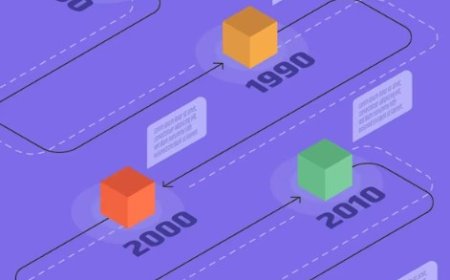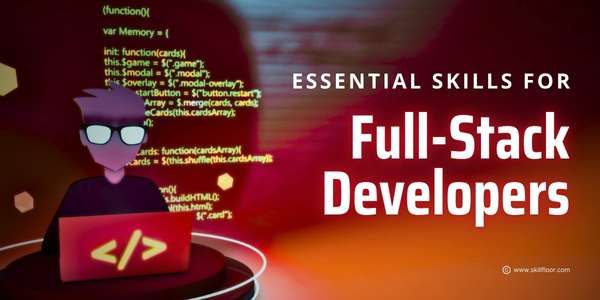The Full Stack Developer: The Superpowers of the Tech World!
Unlock the future of tech with the Full Stack Developer, armed with superpowers to conquer the digital realm!

In today's rapidly evolving technological landscape, the term "full stack developer" is becoming increasingly popular. You may have heard this term thrown around in tech circles, but what does it really mean? Is it a superhero-like role with an encyclopedic knowledge of all things coding? Or is it simply a buzzword used to impress others? In this blog, we'll dive into the world of full stack development and uncover the true essence of this multifaceted role.
What is a Full Stack Developer?
Imagine a developer who possesses the skills to handle every aspect of a web application or software project, from designing and developing the user interface to managing the database and server-side functionality. That, in a nutshell, is what a full stack developer does. They possess a wide range of technical skills and expertise that enables them to work on both the front end (client-side) and back end (server-side) components of a project.
The Foundation: Front-End Development
A full stack developer's journey often begins with front-end development. This refers to the user-facing part of a website or application that users interact with. To be effective in this domain, a full stack developer needs to be proficient in HTML, CSS, and JavaScript, the holy trinity of web development. These languages allow them to create visually appealing and responsive user interfaces that are intuitive and user-friendly.
CSS, the styling language, helps them enhance the aesthetics of a website, while JavaScript brings interactivity and functionality to life. With these front-end skills, full stack developers can make a website or application visually engaging and responsive, ensuring a seamless user experience.
The Backbone: Back-End Development
While front-end development deals with the user interface, back-end development focuses on the behind-the-scenes functionality that powers web applications. A full stack developer needs to have a solid understanding of back-end technologies, such as server-side programming languages (Python, Ruby, Java, etc.), frameworks (Node.js, Django, Ruby on Rails), and databases (MySQL, MongoDB, PostgreSQL). These tools allow them to handle data storage, retrieval, and processing, ensuring that the application runs smoothly and securely.
The full stack developer's role in back-end development includes building APIs (Application Programming Interfaces) to connect the front-end and back-end, implementing authentication and authorization mechanisms, and optimizing database performance. They are responsible for designing and building the server-side architecture, ensuring that all the components work harmoniously together.
The Middleware: Working with Frameworks and Libraries
To enhance their productivity and efficiency, full stack developers often leverage frameworks and libraries. These pre-built tools provide a foundation for building web applications, streamlining the development process. Popular frameworks like React.js, Angular, and Vue.js facilitate front-end development, while frameworks like Express.js, Flask, and Ruby on Rails simplify back-end development.
By utilizing these frameworks and libraries, full stack developers can save time and effort, allowing them to focus on building robust and scalable applications. They can also adapt to new technologies and trends more easily, staying ahead of the curve in the ever-changing tech landscape.
The Enabler: Problem-Solving and Versatility
One of the defining characteristics of a full stack developer is their problem-solving mindset. They possess the ability to tackle challenges at every level of the application stack. Whether it's debugging code, optimizing performance, or finding innovative solutions, their versatile skill set enables them to overcome obstacles efficiently.
Moreover, the versatility of full stack developers makes them valuable assets in various development environments. They can seamlessly transition between different projects, adapt to different programming languages, and contribute to both front-end and back-end teams. This flexibility makes them indispensable to startups, where resources are often limited and multi-tasking is the norm.
The Continuous Learner: Staying Ahead in an Ever-Changing Landscape
The world of technology is a fast-paced one, with new frameworks, libraries, and languages emerging constantly. Full stack developers need to be avid learners, continuously updating their knowledge and acquiring new skills to stay relevant. They need to keep up with the latest trends, best practices, and industry standards to ensure that their applications are up to date and secure.
Online courses, tutorials, coding bootcamps, and developer communities are invaluable resources for full stack developers to expand their knowledge base. Embracing a growth mindset and having a passion for learning are crucial qualities for full stack developers to thrive in their careers.
Here are a few common elements you'll find in a full stack developer's arsenal:
1. Front-end Technologies:
- HTML/CSS: The building blocks of the web, responsible for structure and styling.
- JavaScript: The dynamic language that adds interactivity and functionality to websites.
2. Front-end Frameworks:
- React: A popular JavaScript library for building user interfaces.
- Angular: A comprehensive framework maintained by Google for building robust web applications.
- Vue.js: A progressive framework known for its simplicity and versatility.
3. Back-end Technologies:
- Node.js: A JavaScript runtime that allows server-side development.
- Django: A Python framework for rapid back-end development.
- Ruby on Rails: A powerful framework that emphasizes convention over configuration.
4. Databases:
- MySQL: A widely-used open-source relational database management system.
- MongoDB: A flexible and scalable NoSQL database.
5. Version Control Systems:
- Git: A distributed version control system essential for collaboration and code management.
So, by wrapping up the things in a nutshell, a full stack developer is an all-rounder who possesses a diverse skill set, combining front-end and back-end development expertise. They have the ability to tackle challenges at every layer of the application stack, ensuring the seamless functioning of web applications. With their problem-solving mindset, versatility, and commitment to continuous learning, full stack developers are well-equipped to thrive in the ever-evolving world of technology. So, whether you aspire to become one or work alongside one, understanding the true essence of a full stack developer will undoubtedly shed light on their superpower-like versatility and the value they bring to the table.































































